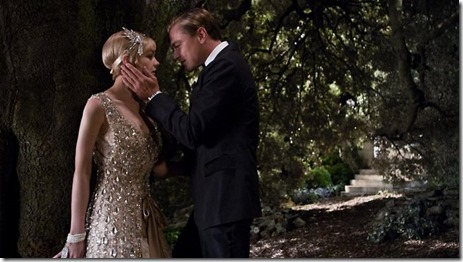I had much the same reaction to The Great Gatsby that I had to Les Miserables – I could probably enumerate a ton of flaws, but I just don’t care because the overall experience is spectacular.
F. Scott Fitzgerald’s slim novel presented cool characters with understandable motivations and simultaneously captured the essence of an era – the 1920s. It was a tale of love vs. reality with a central character who could be hopelessly corrupt and a shining beacon of hope at the same time.
Baz Luhrmann, who has never been known for subtlety or restraint, co-wrote the Gatsby script with Craig Pearce and directed with his usual over-the-top style. Somehow it just works.
Whether he’s splattering words from Nick Carraway’s (Tobey Maguire) narration across the screen, filling the screen with excesses of the parties at Gatsby’s palatial home, or giving Leonardo DiCaprio his head as Jay Gatsby, he is working to a very specific vision. He mixes in anachronisms (the Empire State Building a decade before it was built; a throwaway visual of the famous Times Square sign heralding the Ziegfeld Follies before they happened; rap music in the soundtrack) for deliberate effect – usually to highlight the decadence of the time, but also to underscore emotional moments and build mood.
Of course, if we don’t buy Gatsby, the movie doesn’t work – and DiCaprio is masterful. Even Gatsby’s ‘old sport’ feels unaffected and natural – so what if it’s overused? He captures Gatsby’s battle between remaining cool and wearing his heart on his sleeve, too. Like Nick, whom he befriends to exploit – to wangle an opportunity to see Carraway’s cousin Daisy Buchanan (Cary Mulligan) – we are easily won over.
Through DiCaprio’s naturalistic performance, we come to see Gatsby as a pragmatist who worked to achieve what he has in order to capture a dream. That he continued to hope for his dream to come true – even while his world was falling apart – has a resonance that makes him sympathetic even when we learn his secrets.
Maguire’s Carraway is a naïve failed writer whose narrative is explained in an odd but effective framing sequence that serves as way into his heart. I am giving to understand that his narration is largely taken, word-for-word, from the novel.
Daisy, on the other hand, is a shallow young woman whose aim in live is to live a dream. Her behaviour changes to fit the situations and characters with which she interacts: she is the dutiful (if disappointed) wife to the amoral Tom (Joel Edgerton), but the breathless, luminous lover with Gatsby. And when we learn why she didn’t wait for Gatsby, everything clicks into place for us to understand her. Mulligan is perfect in the role.
The supporting cast is also pretty much on the money. Edgerton gets the sense of entitlement of Tom Buchanan, who comes from old money and doesn’t see his affairs as anything that should offend his wife – he always comes back to her, right? Isla Fisher captures the brassy vulnerability of Tom’s mistress, Myrtle, while Jason Clarke is suitably grubby as her gas station-owning husband, George.
A really standout, though, is Elizabeth Debicki as Daisy’s aggressive, athletic best friend, Jordan Baker (whom she tries to set up with Nick). Debicki is sleek, chic and in control. You’d thick Nick was a fool not to be with her.
Luhrmann’s decision to use 3D was a source of some puzzlement but, like a very few other directors, his use of it is another tool with which he tells his story. Sure, the 3D makes the decadence of Gatsby’s parties pop, but there some moments of quiet beauty as well – the green light on the Buchanans’ dock coming visible through the mist, for one.
The Great Gatsby is a film that will undoubtedly spark a love it or hate it response from its audiences. After the hot mess that was Luhrmann’s Australia, though, he’s taken an American classic and done it justice.
Final Grade: A+
Photo courtesy of Warner Brothers
